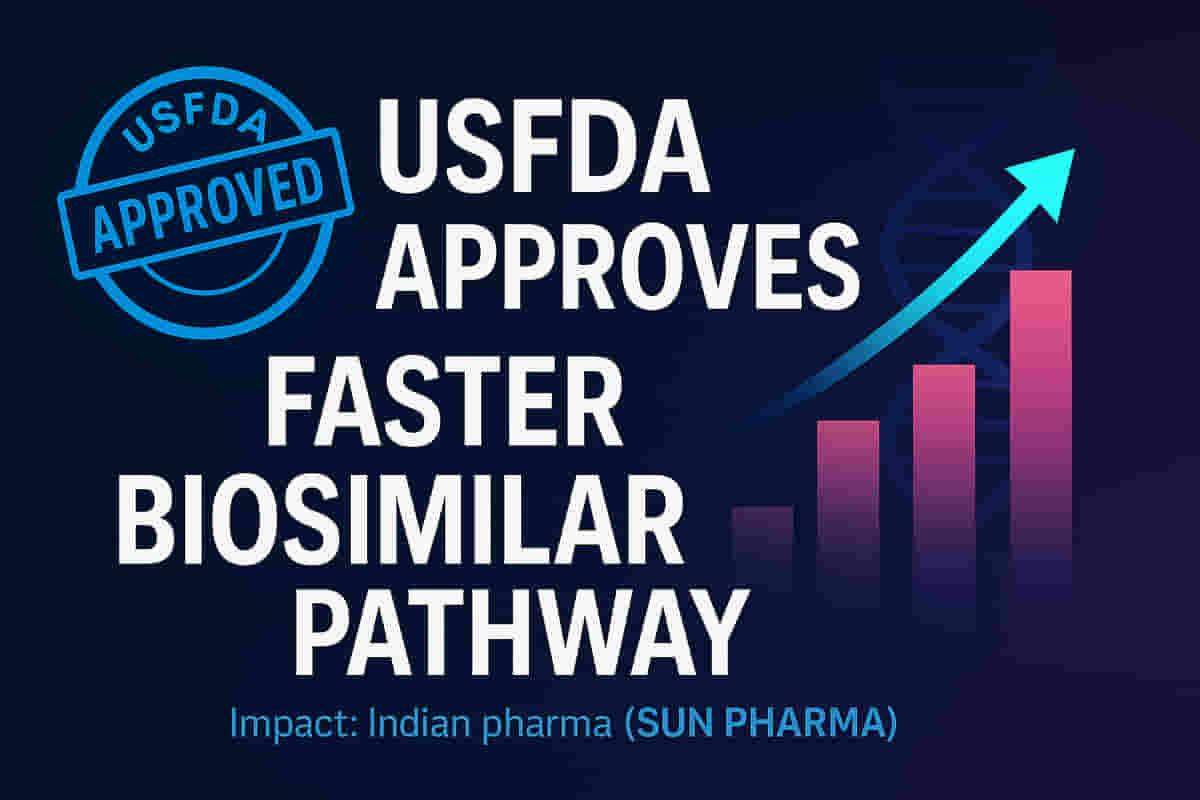USFDA proposes faster, cheaper pathway for biosimilar drugs, benefiting Indian pharma
Healthcare/Biotech
|
Updated on 30 Oct 2025, 03:18 am
Reviewed By
Aditi Singh | Whalesbook News Team
Short Description :

▶
Stocks Mentioned :
Detailed Coverage :
The United States Food and Drug Administration (USFDA) has put forth new draft guidelines aimed at streamlining the process for developing and approving biosimilar drugs. The primary objective of this initiative is to foster biosimilars as a more cost-effective alternative to expensive biologic medications, making them accessible faster and at a lower cost. This regulatory shift is expected to be highly beneficial for major Indian drug manufacturers, including Biocon Limited, Dr. Reddy's Laboratories Limited, Lupin Limited, and Sun Pharmaceutical Industries Limited, all of whom have a considerable presence in the US biosimilars market.
The draft regulations propose to reduce the necessity for expensive and often low-yield comparative efficacy studies. Instead, the USFDA allows for greater reliance on advanced analytical testing and may lessen the burden of large, costly clinical trials. Furthermore, the draft guidelines recommend dropping the requirement for 'Switching studies' for interchangeable biosimilars. Biologics, despite representing only 5% of US prescriptions, accounted for 51% of total drug spending in 2024. Although 76 biosimilars have been approved by the USFDA, their market share remains below 20%. This move could significantly boost the development and adoption of biosimilars.
Impact This development is highly positive for Indian pharmaceutical companies involved in biosimilar production, potentially increasing their market share and revenue from the lucrative US market. The reduced development hurdles could lead to faster product launches and improved profitability. Rating: 9/10
Difficult Terms: Biosimilar: A biological product that is highly similar to an already approved biological product, referring to the reference product, with no clinically meaningful differences in safety, purity, and potency. They are typically cheaper alternatives to biologics. Biologics: Therapeutic products derived from living organisms, such as proteins, antibodies, or vaccines. They are often complex and expensive to develop and manufacture. Comparative efficacy studies: Clinical trials designed to demonstrate that a biosimilar performs similarly to the reference biologic in terms of its therapeutic effect. Analytical testing: Laboratory tests that examine the physical, chemical, and biological properties of a drug to assess its quality and consistency. Switching studies: Clinical studies conducted to evaluate the safety and efficacy of switching patients between a reference biologic and its biosimilar, often required for interchangeable biosimilars.
More from Healthcare/Biotech
Latest News

Auto
Suzuki and Honda aren’t sure India is ready for small EVs. Here’s why.

Brokerage Reports
Stocks to buy: Raja Venkatraman's top picks for 4 November

Mutual Funds
Quantum Mutual Fund stages a comeback with a new CEO and revamped strategies; eyes sustainable growth

Tech
Why Pine Labs’ head believes Ebitda is a better measure of the company’s value

Banking/Finance
SEBI is forcing a nifty bank shake-up: Are PNB and BoB the new ‘must-owns’?

Industrial Goods/Services
India’s Warren Buffett just made 2 rare moves: What he’s buying (and selling)
Renewables Sector

Renewables
Brookfield lines up $12 bn for green energy in Andhra as it eyes $100 bn India expansion by 2030
Energy Sector

Energy
India's green power pipeline had become clogged. A mega clean-up is on cards.
Renewables Sector

Brookfield lines up $12 bn for green energy in Andhra as it eyes $100 bn India expansion by 2030
Energy Sector
